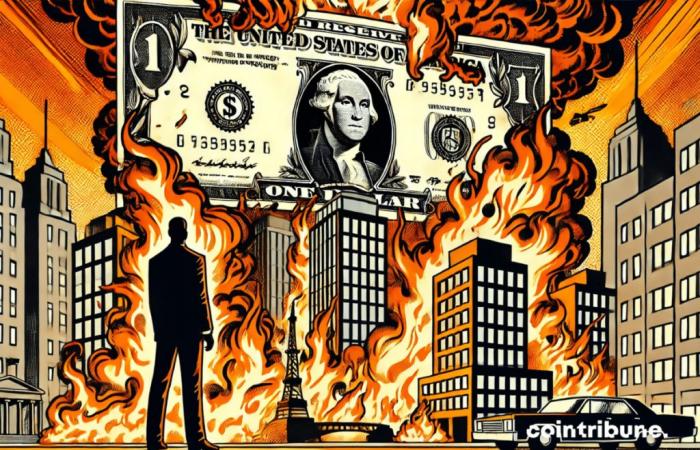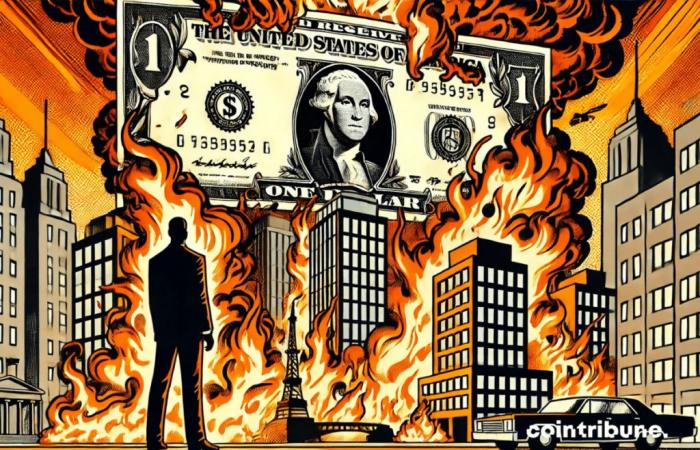20:00 ▪
4
min reading ▪ by
Luc Jose A.
As the global economy attempts to stabilize after years of uncertainty, U.S. government debt is attracting renewed attention. Indeed, with a level reaching 125% of GDP in 2024 and a growing budget deficit, this problem worries international institutions, notably the European Central Bank (ECB). Thus, the recent declarations of its vice-president, Luis de Guindos, underline the urgency of the situation and its potential repercussions on the euro zone.
A public debt of historic proportions
The US public debt continues to rise, reaching unprecedented levels. According to recent data, it is now equivalent to 125% of the United States’ gross domestic product (GDP). The budget deficit, meanwhile, jumped to 6.4% of GDP in 2024 from 6.2% the previous year. Thus, Luis de Guindos, vice-president of the ECB, declared during a banking conference in Frankfurt: “the debt could explode with an additional 15,000 billion dollars over the next decade, according to the Committee for a Responsible Federal Budget ( CRFB)”. This scenario raises concerns about the ability of the United States to contain these budgetary imbalances.
Such a situation is partly the result of current economic policies. Promises of tax reductions combined with continued public spending risk worsening budgetary imbalances. In addition, the customs duties introduced by the Trump administration are not enough to offset these drops in tax revenue. This dynamic, described as “XXL protectionism”, is already weighing on the value of the dollar, which is appreciating against the euro, thus disrupting transatlantic trade balances.
Global and European repercussions
Beyond America’s borders, America’s colossal debt poses a direct threat to the global economy. Additionally, with 23% of this debt held by foreign investors, a crisis could significantly affect international financial markets. Maria Vassalou, director of the Pictet Research Institute, summarizes the situation as follows: “the rest of the world has a lot to lose in the event of an American debt crisis, because it has financed the American deficit by purchasing dollars, Treasury bonds and American stocks. Concerns are growing as protectionist economic policies increase trade tensions and reduce market stability.
For the eurozone, the potential consequences are just as significant. While the ECB strives to stabilize inflation around 2%, the weak economic performance of the last quarter reveals productivity at half mast and growth prospects revised downwards. Luis de Guindos warns that these “cyclical headwinds” are exacerbating the eurozone’s structural problems, undermining efforts to strengthen economic resilience.
While the United States remains attractive to investors thanks to its ability to issue debt in its own currency, growing tensions and protectionist policies could reverse this dynamic. Careful management of these challenges will be crucial to avoiding a global financial crisis. At the same time, the eurozone must strengthen its economic mechanisms to guard against potential turbulence. US debt is a mirror of global imbalances, and calls for international coordination to stabilize an increasingly interconnected financial system.
Maximize your Cointribune experience with our ‘Read to Earn’ program! For every article you read, earn points and access exclusive rewards. Sign up now and start earning benefits.
Luc Jose A.
A graduate of Sciences Po Toulouse and holder of a blockchain consultant certification issued by Alyra, I joined the Cointribune adventure in 2019. Convinced of the potential of blockchain to transform many sectors of the economy, I took the commitment to raise awareness and inform the general public about this constantly evolving ecosystem. My goal is to enable everyone to better understand blockchain and seize the opportunities it offers. I strive every day to provide an objective analysis of current events, to decipher market trends, to relay the latest technological innovations and to put into perspective the economic and societal issues of this ongoing revolution.







